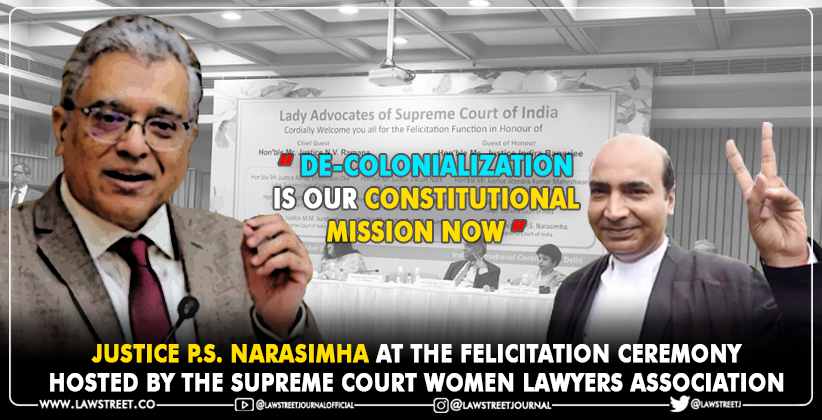On Sunday (September 26, 2021), a felicitation ceremony was hosted by the Supreme Court Women Lawyers Association headed by Sr. Adv. Mahalakshmi Pavani in honor of the Hon'ble Chief Justice of India NV Ramana and the newly elevated nine judges.
The event was attended by several noted members from the judiciary, including Justice CV Nagarjuna Reddy, Justice CT Ravikumar, Justice Bela Trivedi, and Justice P.S. Narasimha, with Hon'ble Justice Ms. Indira Banerjee being the Guest of Honor.
While addressing the audiences, each of the members present made valid observations and even lauded the organizers of the program for their efforts. As part of his speech, Justice P.S. Narasimha also touched upon the need for de-colonization of the Indian Judicial system.
"the other day, I saw a news report, in which the Hon'ble Chief Justice has said that the Indian Judicial is affected so much by colonialism. That is where it actually struck me that de-colonization is actually a constitutional mission for us," Justice Narsimha stated.
He further added that the colonial laws and the large number of judicial interpretations that the country has suffered since the past 70 years need to be re-looked at so that a new and much-needed perspective can be brought about in the judiciary.
Justice Narsimha was referring to CJI NV Ramana's address at the recently organized event by the Karnataka State Bar Council to pay tribute to Late Justice MM Shantanagouder on September 18, 2021. During the same, the CJI had remarked that "The need of the hour is the Indianization of the justice delivery system." He also stated that courts should be litigant-friendly, and focus should be given to Alternative Dispute Resolution (ADR) as a means of saving resources and reducing the pendency of cases.
It is pertinent to note that in matching the very views of the prominent Justice Narsimha and CJI Ramana, Advocate Ashwini Upadhyay has also raised his voice time and again against the colonial laws that still exist in the country. He has filed PIL appealing 'One Nation, One Penal Code' and has also addressed the issue at the public gathering in Jantar Mantar on August 8, 2021.
Stating that there is an urgent need to replace colonial laws with comprehensive and stringent laws that are in line with the requirements of contemporary India, Advocate Upadhyay remarked, 'There are 221 Acts which were drafted before our country got independence and sadly these Acts still remain in force and govern the justice delivery system of present-day India. The Indian Penal Code, 1860, The Indian Evidence Act, 1871, The Police Act, 1861 are few examples of the colonial Acts which need to be replaced with more stringent and comprehensive laws."
In a similar event for the inauguration of a new building of the Odisha State Legal Services Authority at Cuttack, CJI Ramana had also stated that the notion about court making the law needs to be dispelled, but the legislature and executive need to step up. He said, "The Legislature needs to revisit the laws and reform them to suit the needs of time and people. I emphasize, our laws must match with our practical realities. The executive has to match these efforts by way of simplifying the corresponding rules."
Adding that the legal framework needs to be drastically altered to make the justice delivery mechanism people friendly, he further added, "At the end of the day, it is the harmonious functioning of the three organs of the state (legislature, executive, and judiciary) that can remove the procedural barriers to justice.









